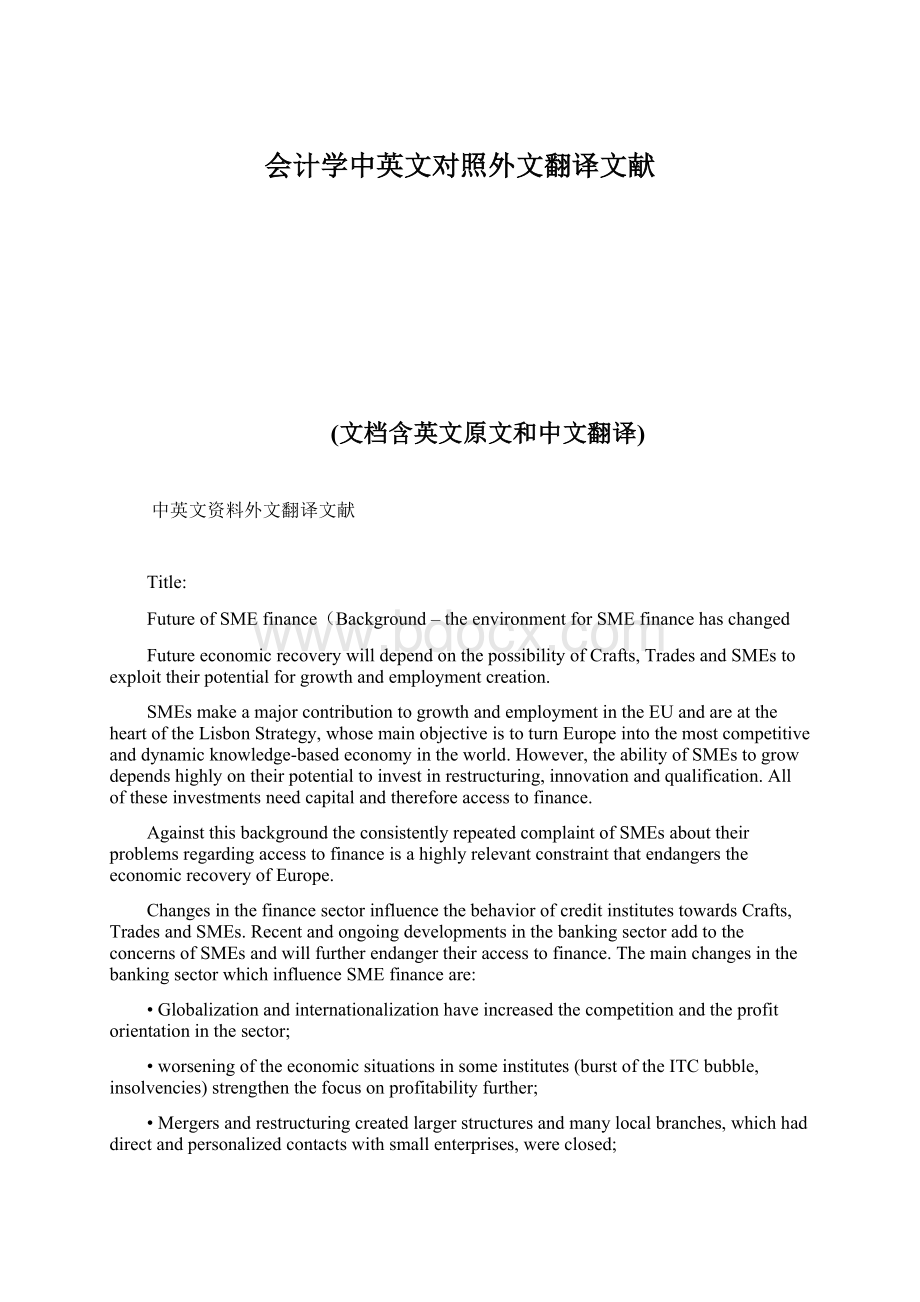会计学中英文对照外文翻译文献文档格式.docx
《会计学中英文对照外文翻译文献文档格式.docx》由会员分享,可在线阅读,更多相关《会计学中英文对照外文翻译文献文档格式.docx(9页珍藏版)》请在冰豆网上搜索。

FutureofSMEfinance(Background–theenvironmentforSMEfinancehaschanged
FutureeconomicrecoverywilldependonthepossibilityofCrafts,TradesandSMEstoexploittheirpotentialforgrowthandemploymentcreation.
SMEsmakeamajorcontributiontogrowthandemploymentintheEUandareattheheartoftheLisbonStrategy,whosemainobjectiveistoturnEuropeintothemostcompetitiveanddynamicknowledge-basedeconomyintheworld.However,theabilityofSMEstogrowdependshighlyontheirpotentialtoinvestinrestructuring,innovationandqualification.Alloftheseinvestmentsneedcapitalandthereforeaccesstofinance.
AgainstthisbackgroundtheconsistentlyrepeatedcomplaintofSMEsabouttheirproblemsregardingaccesstofinanceisahighlyrelevantconstraintthatendangerstheeconomicrecoveryofEurope.
ChangesinthefinancesectorinfluencethebehaviorofcreditinstitutestowardsCrafts,TradesandSMEs.RecentandongoingdevelopmentsinthebankingsectoraddtotheconcernsofSMEsandwillfurtherendangertheiraccesstofinance.ThemainchangesinthebankingsectorwhichinfluenceSMEfinanceare:
•Globalizationandinternationalizationhaveincreasedthecompetitionandtheprofitorientationinthesector;
•worseningoftheeconomicsituationsinsomeinstitutes(burstoftheITCbubble,insolvencies)strengthenthefocusonprofitabilityfurther;
•Mergersandrestructuringcreatedlargerstructuresandmanylocalbranches,whichhaddirectandpersonalizedcontactswithsmallenterprises,wereclosed;
•up-comingimplementationofnewcapitaladequacyrules(BaselII)willalsochangeSMEbusinessofthecreditsectorandwillincreaseitsadministrativecosts;
•StricterinterpretationofState-AideRulesbytheEuropeanCommissioneliminatesthesupportofbanksbypublicguarantees;
manyoftheeffectedbanksareveryactiveinSMEfinance.
Allthesechangesresultinahighersensitivityforrisksandprofitsinthefinancesector.
ThechangesinthefinancesectoraffecttheaccessibilityofSMEstofinance.
Higherriskawarenessinthecreditsector,astrongerfocusonprofitabilityandtheongoingrestructuringinthefinancesectorchangetheframeworkforSMEfinanceandinfluencetheaccessibilityofSMEstofinance.Themostimportantchangesare:
•Inordertomakethehigherriskawarenessoperational,thecreditsectorintroducesnewratingsystemsandinstrumentsforcreditscoring;
•RiskassessmentofSMEsbybankswillforcetheenterprisestopresentmoreandbetterqualityinformationontheirbusinesses;
•Bankswilltrytopassthroughtheiradditionalcostsforimplementingandrunningthenewcapitalregulations(BaselII)totheirbusinessclients;
•duetotheincreaseofcompetitiononinterestrates,thebanksectordemandsmoreandhigherfeesforitsservices(administrationofaccounts,paymentssystems,etc.),whicharenotonlyadditionalcostsforSMEsbutalsolimittheirliquidity;
•Smallenterpriseswilllosetheirpersonalrelationshipwithdecision-makersinlocalbranches–thecreditapplicationprocesswillbecomemoreformalandanonymousandwillprobablyloselonger;
•thecreditsectorwilllosemoreandmoreits“publicfunction”toprovideaccesstofinanceforawiderangeofeconomicactors,whichithasinanumberofcountries,inordertosupportandfacilitateeconomicgrowth;
theprofitabilityoflendingbecomesthemainfocusofprivatecreditinstitutions.
AllofthesedevelopmentswillmakeaccesstofinanceforSMEsevenmoredifficultand/orwillincreasethecostofexternalfinance.Businessstart-upsandSMEs,whichwanttoenternewmarkets,mayespeciallysufferfromshortagesregardingfinance.AEuropeanCodeofConductbetweenBanksandSMEswouldhaveallowedatleastmoretransparencyintherelationsbetweenBanksandSMEsandUEAPMEregretsthatthebanksectorwasnotabletoagreeonsuchacommitment.
TowardsanencompassingpolicyapproachtoimprovetheaccessofCrafts,TradesandSMEstofinance
AllanalysesshowthatcreditsandloanswillstaythemainsourceoffinancefortheSMEsectorinEurope.AccesstofinancewasalwaysamainconcernforSMEs,buttherecentdevelopmentsinthefinancesectorworsenthesituationevenmore.Shortageoffinanceisalreadyarelevantfactor,whichhinderseconomicrecoveryinEurope.ManySMEsarenotabletofinancetheirneedsforinvestment.
Therefore,UEAPMEexpectsthenewEuropeanCommissionandthenewEuropeanParliamenttostrengthentheireffortstoimprovetheframeworkconditionsforSMEfinance.Europe’sCrafts,TradesandSMEsaskforanencompassingpolicyapproach,whichincludesnotonlytheconditionsforSMEs’accesstolending,butwillalsostrengthentheircapacityforinternalfinanceandtheiraccesstoexternalriskcapital.
FromUEAPME’spointofviewsuchanencompassingapproachshouldbebasedonthreeguidingprinciples:
•Risk-sharingbetweenprivateinvestors,financialinstitutes,SMEsandpublicsector;
•IncreaseoftransparencyofSMEstowardstheirexternalinvestorsandlenders;
•improvingtheregulatoryenvironmentforSMEfinance.
BasedontheseprinciplesandagainstthebackgroundofthechangingenvironmentforSMEfinance,UEAPMEproposespolicymeasuresinthefollowingareas:
1.NewCapitalRequirementDirective:
SMEfriendlyimplementationofBaselII
Duetointensivelobbyingactivities,UEAPME,togetherwithotherBusinessAssociationsinEurope,hasachievedsomeimprovementsinfavourofSMEsregardingthenewBaselAgreementonregulatorycapital(BaselII).ThefinalagreementfromtheBaselCommitteecontainsamuchmorerealisticapproachtowardtherealrisksituationofSMElendingforthefinancemarketandwillallowthenecessaryroomforadaptations,whichrespectthedifferentregionaltraditionsandinstitutionalstructures.
However,thenewregulatorysystemwillinfluencetherelationsbetweenBanksandSMEsanditwilldependverymuchonthewayitwillbeimplementedintoEuropeanlaw,whetherBaselIIbecomesburdensomeforSMEsandifitwillreduceaccesstofinanceforthem.
ThenewCapitalAccordformtheBaselCommitteegivesthefinancialmarketauthoritiesandherewiththeEuropeanInstitutions,alotofflexibility.Inabout70areastheyhaveroomtoadapttheAccordtotheirspecificneedswhenimplementingitintoEUlaw.SomeofthemwillhaveimportanteffectsonthecostsandtheaccessibilityoffinanceforSMEs.
UEAPMEexpectsthereforefromthenewEuropeanCommissionandthenewEuropeanParliament:
•TheimplementationofthenewCapitalRequirementDirectivewillbecostlyfortheFinanceSector(upto30BillionEurotill2006)anditsclientswillhavetopayforit.Therefore,theimplementation–especiallyforsmallerbanks,whichareoftenveryactiveinSMEfinance–hastobecarriedoutwithaslittleadministrativeburdensomeaspossible(reportingobligations,statistics,etc.).
•TheEuropeanRegulatorsmustrecognizetraditionalinstrumentsforcollaterals(guarantees,etc.)asfaraspossible.
•TheEuropeanCommissionandlatertheMemberStatesshouldtakeovertherecommendationsfromtheEuropeanParliamentwithregardtogranularity,accesstoretailportfolio,maturity,partialuse,adaptationofthresholds,etc.,whichwilleasetheburdenonSMEfinance.
2.SMEsneedtransparentratingprocedures
DuetohigherriskawarenessofthefinancesectorandtheneedsofBaselII,manySMEswillbeconfrontedforthefirsttimewithinternalratingproceduresorcreditscoringsystemsbytheirbanks.Thebankwillrequiremoreandbetterqualityinformationfromtheirclientsandwillassesstheminanewway.Bothup-comingdevelopmentsarealreadycausingincreasinguncertaintyamongstSMEs.
InordertoreducethisuncertaintyandtoallowSMEstounderstandtheprinciplesofthenewriskassessment,UEAPMEdemandstransparentratingprocedures–ratingproceduresmaynotbecomea“BlackBox”forSMEs:
•ThebankshouldcommunicatetherelevantcriteriaaffectingtheratingofSMEs.
•ThebankshouldinformSMEsaboutitsassessmentinordertoallowSMEstoimprove.
ThenegotiationsonaEuropeanCodeofConductbetweenBanksandSMEs,whichwouldhaveincludedaself-commitmentfortransparentratingproceduresbyBanks,failed.Therefore,UEAPMEexpectsfromthenewEuropeanCommissionandthenewEuropeanParliamentsupportfor:
•bindingrulesintheframeworkofthenewCapitalAdequacyDirective,whichensurethetransparencyofratingproceduresandcreditscoringsystemsforSMEs;
•ElaborationofnationalCodesofConductinordertoimprovetherelationsbetweenBanksandSMEsandtosupporttheadaptationofSMEstothenewfinancialenvironment.
3.SMEsneedanextensionofcreditguaranteesystemswithaspecialfocusonMicro-Lending
Businessstart-ups,thetransferofbusinessesandinnovativefastgrowthSMEsalsodependedinthepastveryoftenonpublicsupporttogetaccesstofinance.IncreasingriskawarenessbybanksandthestricterinterpretationofStateAidRuleswillfurtherincreasetheneedforpublicsupport.
Alreadynow,therearecreditguaranteeschemesinmanycountriesonthelimitoftheircapacityandtoomanyinvestmentprojectscannotberealizedbySMEs.
ExperiencesshowthatPublicmoney,spentforsupportingcreditguaranteessystems,isaveryefficientinstrumentandhasamuchhighermultiplyingeffectthanotherinstruments.OneEuroformtheEuropeanInvestmentFundscanstimulate30EuroinvestmentsinSMEs(forventurecapitalfundstherelationisonly1:
2).
Therefore,UEAPMEexpectsthenewEuropeanCommissionandthenewEuropeanParliamenttosupport:
•Theext